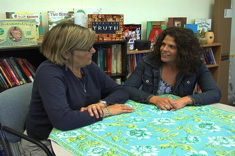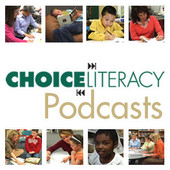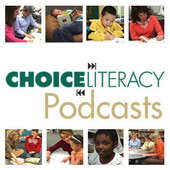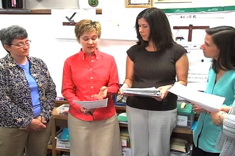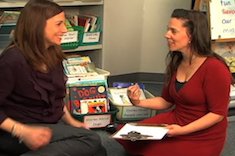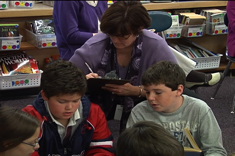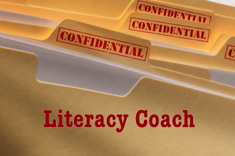Literacy Coaches
A simple question - who will coach the coaches? If you're a literacy coach, you already know there is no job more amazing or overwhelming in a school. Our Choice Literacy library includes a small sample of our resources for literacy coaches. If you work as a coach, you'll want a subscription that includes access to our Leaders Lounge, where there are over 900 resources for coaches, including study group protocols, videos of demonstration lessons, and guides for designing coaching cycles.
Latest Content
Coaching Beyond the Curriculum: Reframing Our Talk and Attitude Toward Difficult Students
What role should literacy coaches have in helping teachers manage unruly students? Melanie Quinn settles into a morning of poring over assessment data, only to have it interrupted by a child who has been disrupting his class. Her interactions with Darren and his teacher lead to strategies for helping colleagues take an inquiry stance with challenging children.
From Teacher to Coach: Building Community in the Early Days
The transition from teacher to coach is tricky. Melanie Quinn has advice for building relationships with colleagues in the first weeks of school.
Coaching Codes
A code of conduct is created to outline the standards and rules of behavior that guide an organization. Effective codes spell out “unspoken rules” as well, so that everyone can be successful. Heather Rader thinks through what a useful code for coaches might look like.
Jennifer Allen on Working with New Teachers (PODCAST)
New teachers need thoughtful support – Jennifer Allen has suggestions on how to provide that assistance in this podcast.
Undercover Coach: Making Time to Work with Children
If you're a literacy coach, the most important question to ask yourself may be this: How much time am I spending in classrooms? Shari Frost writes about how coaches can move beyond a quest for perfect demo lessons to a stance of co-learners with teachers.
Jennifer Allen on Working with Veteran Teachers (PODCAST)
Jennifer Allen has developed some innovative support systems for veteran teachers. She shares her insights in this podcast.
Coaching Out of Chaos: Helping New Teachers Establish Management Systems
The #1 issue for many new teachers is management. Heather Rader shares how she tactfully assisted a novice teacher who needed help.
Who Rules?: Creating a Classroom Code of Conduct with Students
Heather Rader works with a young teacher to establish a better management system.
“To Teach is to Learn Twice”: Creating Professional Communities in Schools
What are the hallmarks of professional learning communities that work well in schools?
Returning to Our Creation Chambers: Supporting Experienced Teachers
Jennifer Allen reflects on her experiences as a teacher, and develops ways to help the veteran teachers she works with return to their “creation chambers.”
Creating Shared Learning Experiences for New and Veteran Teachers
Laughter or struggles – the experiences we share are the ones that bind us together. Jennifer Allen mulls over how to foster more of those shared experiences for the colleagues she coaches.
Assessing Professional Development: Focus on Feedback
Jennifer Allen details her professional development formats, and the crucial role feedback plays in their success.
You Get What You Ask For: The Art of Debriefing
Heather Rader explores the fine art of asking specific questions during coaching debrief sessions.
Tips for More Effective Debriefing Sessions
Clare Landrigan and Tammy Mulligan share strategies and seven different observation templates for participants to download and try out.
Making the Case for Literacy Coaches
If your district is considering cuts to its literacy coaching program, you’ll appreciate Shari Frost’s advice.
Learning from Coaching Mistakes
Inventors understand that early prototypes inform them best about what doesn't work rather than what does. But what about when prototypes are people? Heather Rader reflects on risk-taking, failure, and learning as a literacy coach.
My Colleague Refuses to Collaborate with Us (LITERACY COACH CONFIDENTIAL)
What do you do about a colleague who refuses to collaborate with other teachers on her grade-level team? Literacy Coach Confidential takes on the problem, with suggestions from seven Choice Literacy contributors.
Implementing RTI: Keeping Students at the Heart of Our Conversations
Jennifer Allen provides some prompts for staff discussions about Response to Intervention to help you connect long-term goals and beliefs with short-term strategies.
A Coach’s Perspective: Is Sarcasm in Style This Season?
When is sarcasm appropriate in classrooms? Never, yet more is popping up all the time in schools, even from teachers. Here is some advice for dealing with sarcasm.
There’s Been a Misblunderstanding
We're teachers and we have a tendency to talk too much. Heather Rader explains how she coaches a teacher through the problem.
How to Use a Coach: Four Things to Consider
Teachers, are you getting the most out of your relationships with the literacy coaches and other mentors in your midst? Heather Rader has some thoughtful back-to-school advice for building more powerful teacher-coach relationships
How to Be of Use: Starting Strong
Heather Rader offers sage advice for coaches who want to be of use. Using a mnemonic device—”Peppers make cats cry”—you’ll be ready to start the year strong.
The DIBELS Divide (LITERACY COACH CONFIDENTIAL)
A curriculum coordinator loves DIBELS; a first-grade teacher doesn't. We provide a range of suggestions from our contributors on dealing with disagreements over assessment. This article is useful for teachers and literacy leaders who are working together with assessment data early in the year, no matter what evaluative system your school or district has in place.
Triangulating: The Importance of Multiple Data Points When Assessing Students
No data point for any child stands alone. Clare Landrigan and Tammy Mulligan write about the importance of triangulating data when looking at student assessments, and in the process affirm the value of classroom observations.
A Coach’s Perspective: No More Flying Pig Prompts
Heather Rader has advice for literacy coaches dealing with teachers who rely too much on writing prompts.
The Over-Prompting of Young Writers
Heather Rader shares strategies teachers at any grade level can use to become more thoughtful and flexible in their use of prompts.
A Reason to Learn
Jennifer Allen reflects on why and how literacy leaders need to make their professional development offerings more relevant and rigorous for teachers.
Literacy Coach Confidential: My Colleague Talks Too Much!
Yakity yak won't bring 'em back to study groups when someone talks far too much. Here is advice from Choice Literacy contributors on how to deal with those "overtalkers" with tact and grace.
What’s the Most Beautiful Thing You Know About…?
Ruth Shagoury and Melanie Quinn asked their colleagues to share the “most beautiful thing” about the puzzling student each of them is looking at closely in their study group. This is a great activity you’re looking for a quick and easy icebreaker to spark some positive energy in your next study group or staff meeting, and remind everyone of the joys of our profession.
Read Our Walls: Bridging Professional Development and Student Achievement
Jennifer Allen and her colleagues knew test scores weren’t the only way of defining their students’ achievements and the value of their professional development program. “Read Our Walls” is an easy but powerful way to celebrate writing from the entire school community.
Browse Content By
Type
Category
- Assessment Tools
- Big Fresh Archives
- Booklists
- Choice Numeracy
- Classroom Design
- Common Core
- Community Building
- Conferring
- Content Literacy
- Digital Literacy
- English Language Learners
- Equity
- Family Relations
- Free Samples
- Guiding Groups
- Leadership
- Literacy Coaches
- Mentor Texts
- Minilessons
- New Teacher Mentors
- Podcasts
- Poetry
- Quote Collections
- Reading Strategies
- Self Care
- Struggling and Striving Learners
- Talking and Listening
- Teacher Study Groups
- Teaching Reading
- Teaching Writing
- Word Study and Vocabulary
Author
- Melissa Quimby
- Nawal Qarooni
- Gwen Blumberg
- Julie Cox
- The Lead Learners
- Hannah Tills
- Josie Stewart
- Ruth Metcalfe
- Mallory Messenger
- Becca Burk
- Jodie Bailey
- Vivian Chen
- Mary Brower
- Tiffany Abbott Fuller
- Stephanie Affinito
- Ruth Ayres
- Leigh Anne Eck
- Heather Fisher
- Shari Frost
- Julie Johnson
- Suzy Kaback
- Gigi McAllister
- Shirl McPhillips
- Melanie Meehan
- Cathy Mere
- Debbie Miller
- Tara Barnett and Kate Mills
- Tammy Mulligan
- Dana Murphy
- Bitsy Parks
- David Pittman
- Brenda Power
- Heather Rader
- Matt Renwick
- Mandy Robek
- Christy Rush-Levine
- Gretchen Schroeder
- Jen Schwanke
- Brian Sepe
- Katherine Sokolowski
- Stella Villalba
- Jennifer Vincent
Grade Level
Choice Literacy Membership
Articles
Get full access to all Choice Literacy article content
Videos
Get full access to all Choice Literacy video content
Courses
Access Choice Literacy course curriculum and training


